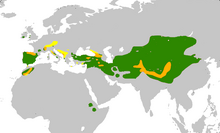| Chough | |
|---|---|
Left: red-billed chough (Pyrrhocorax pyrrhocorax), in Ireland; right: Alpine chough (Pyrrhocorax graculus), in Switzerland | |
| Scientific classification | |
| Domain: | Eukaryota |
| Kingdom: | Animalia |
| Phylum: | Chordata |
| Class: | Aves |
| Order: | Passeriformes |
| Family: | Corvidae |
| Subfamily: | Pyrrhocoracinae |
| Genus: | Pyrrhocorax Tunstall, 1771 |
| Type species | |
| Upupus pyrrhocorax[1] Linnaeus, 1758
| |
| Species | |
|
Red-billed chough (Pyrrhocorax pyrrhocorax) | |

| |
Alpine chough
Red-billed chough Both species | |
There are two species of passerine birds commonly called chough (/tʃʌf/ CHUF) that constitute the genus Pyrrhocorax of the Corvidae (crow) family of birds. These are the red-billed chough (Pyrrhocorax pyrrhocorax) and the Alpine chough (or yellow-billed chough) (Pyrrhocorax graculus). The white-winged chough of Australia, despite its name, is not a true chough but rather a member of the family Corcoracidae and only distantly related.
The choughs have black plumage and brightly coloured legs, feet and bills and are resident in the mountains and rocky sea-cliffs of southern Eurasia and North Africa. They have long broad wings and perform spectacular aerobatics. Both species pair for life and display fidelity to their breeding sites, which are usually caves or crevices in a cliff face. They build a lined stick nest and lay three to five eggs. They feed, usually in flocks, on short grazed grassland, taking mainly invertebrate prey, supplemented by vegetable material or food from human habitation, especially in winter.
Changes in agricultural practices, which have led to local population declines and range fragmentation, are the main threats to this genus, although neither species is threatened globally.
- ^ "Corvidae". aviansystematics.org. The Trust for Avian Systematics. Retrieved 2023-07-16.

